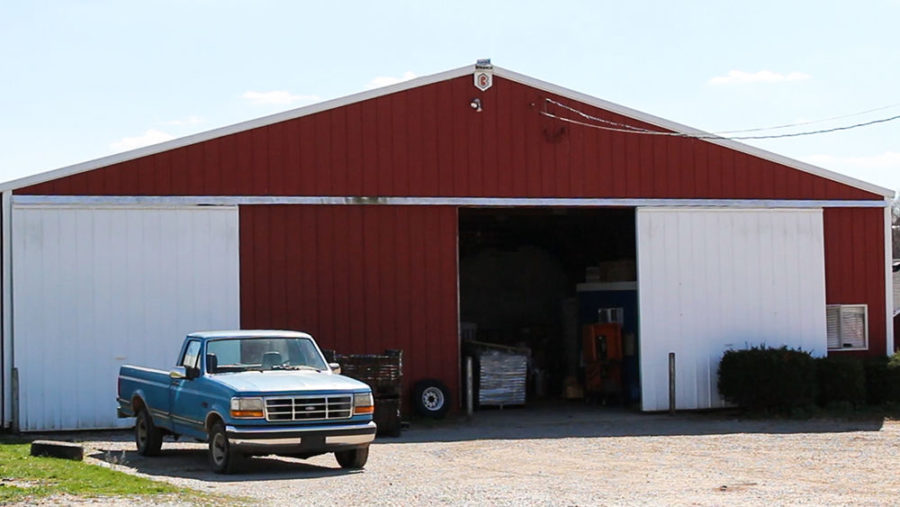Thinking like a farmer is Kentucky’s path forward
Founded in 1959 by Carl and Bertha Fister, Bi-Water Farm and Greenhouse is a mainstay in Kentucky farming and agriculture, and a member of Kentucky Proud. Photo by Kelly Brightmore
March 27, 2020
Kentucky has always sat at a crossroads. It sits at the geographic and cultural meeting point of the South and the Midwest that has given it it’s unique identity that is greater than the sum of its parts.
We now find ourselves at a new crossroad. Since settlers first made claims west of the Cumberland Gap, we have always been a very agrarian state; however, the technological advancements that have brought us easy access to information, increased productivity, and global communication and transportation networks have begun to rapidly change this. A Kentuckian from a century ago would hardly recognize our commonwealth. When she or he was born, half of Americans worked on farms. Now, GPS systems, half-million dollar combines, and drones have left less than 2% of our population working the land.
While some might see this as progress, or as liberation from the agrarian lifestyle, I fear that it has far-reaching implications that we must combat. First, we as consumers have become removed from where our food comes from. Most Kentuckians likely haven’t stepped foot on a farm, and I bet that few could identify many of the plants that farmers grow.
This is because we as consumers have found ourselves at the end of a long marketing chain that involves transforming food into “products,” “alternatives,” and “substitutes” — packaging it in plastic and setting it on a grocery store shelf. As author Michael Pollan chides, “Don’t eat anything your great grandmother wouldn’t recognize as food.” I feel few of us would do her proud with the products we consume.
The second concern we face is the loss of farms in general. Commodity agriculture has become an arms race of land size, machinery, and technology focused on producing the most for as cheap as possible. Kentucky doesn’t have the large tracts of easy to farm land. We have beautiful hills, creeks, rivers, knobs, and caves that keep us from being one big field of corn and soybeans. But this also means we can’t compete well with corporately owned operations that cover thousands of acres with a single monoculture and are run more like factories than farms.
In Kentucky, more than 90% of our farms are family owned and the average farm size is 169 acres. Small family farms have already begun to fail to compete with corporate farms. According to FarmAid, “In 2018, median farm income was -$1,840 — meaning that farm households lost money from the farm.” Many have been pushed into the game of buying newer, bigger equipment to stay competitive, but purchase this equipment on loans they won’t be able to pay. It is clear that our farmers are facing a financial crisis, and with this comes a culture crisis.
As family farmers are forced to sell their farms or the farms are abandoned by the children of farmers not wishing to carry on their parent’s labors, we will lose some of the best stewards of our land. People who have relied on their land to sustain both themselves and their children have only been able to do so out of respect.
Before the rise of industrial agriculture, farmers had to be in tune with the natural processes that regulate our ecosystem: climate patterns, water and nutrient cycles, and biological systems. To understand these concepts and harness them to create food requires an understanding of cause and effect. This holistic worldview is missing in many parts of our society, which has trended towards specialization, as Wendell Berry observed almost fifty years ago.
I am not the first to notice the decline of family farms and their rural communities. Berry has long been an outspoken advocate for the agrarian lifestyle, and nearly all of my points raised in this article were foreseen by him. It is urgent that we revisit his ideas and face the realities that we face as a state moving forward.
This will require us to rethink how we apply the word growth. Growth is often tried to be measured through single variables: population, increases in GDP, farm productivity, etc. We must begin to think about the cause and effect behind every statistic, trend, and policy that we see. The numbers may show we are producing more corn, but is it mainly being produced by only a few large farms? Are soils being allowed to recover and build? Is that increase in tonnage a result of an equal increase in nitrogen-based fertilizers that lead to the eutrophication of our waterways? Are farmers being forced to sacrifice their solvency for bigger yields?
This is the kind of critical thinking necessary to identify the problems and seek solutions. Kentucky is still an agrarian state at least culturally, even if the economic impact is being overshadowed by the service and industrial sectors. That culture is something we cannot allow to perish. The holistic thinking of a family farmer considering the well-being of their land and family is essential to addressing the larger problems facing our state. I don’t foresee Kentucky becoming the wealthiest, healthiest, or most socially progressive state anytime soon, but we can become the wisest.
By supporting Kentucky family farms, we can rejuvenate rural communities, provide healthier food across the Commonwealth, and keep alive a lifestyle that has served as the backbone of Kentucky for centuries. We will be establishing a wisdom that is now often called “sustainability” that recognizes that healthy growth can’t come from the decline of something else. Similarly, Kentucky can’t grow if our family farms are failing, and we can’t afford to lose them.




















































































































































